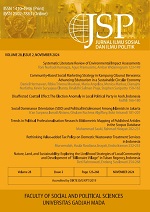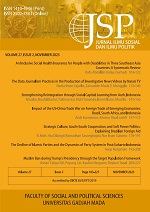The Political Language of Disaster: Indonesian Government Communication for Handling the Covid-19 Pandemic
Fariz Alnizar(1*), Fadlil Munawwar Manshur(2)
(1) Nahdlatul Ulama University of Indonesia, Indonesia
(2) Faculty of Cultural Science, Universitas Gadjah Mada, Indonesia
(*) Corresponding Author
Abstract
Indonesia is one of the most populous countries exposed to Covid-19 with a high mortality rate. The pandemic has been in Indonesia since March 2020, but before the Covid-19 virus was officially declared to enter Indonesia, the Indonesian government previously took this threat lightly. It showed that the Indonesian government was using political language such as disaster communication. Some disparaging comments left public officials. This research uses a qualitative approach with content analysis techniques. The primary data is derived from President Joko Widodo’s speech at Bogor Palace and the tweets of @kemenkes @BNPB and @Jokowi’s Twitter accounts related to Covid-19. This research examines how the Indonesian government communicates its policies in overcoming the Covid-19 pandemic. Furthermore, this research is intended to reveal the narrative developed by the Indonesian government in campaigning for policies to overcome the Covid-19 pandemic. The results show that there are doubts from the government in determining the policies to be taken to overcome the spread of Covid-19. The narrative developed by the government—like the phrase “new normal” and “enggak mudik” phrase—is a narrative that is intended to create calm, even though it can endanger public health.
Keywords
Full Text:
PDFReferences
Abdullah, I. (2020). COVID-19: Threat and Fear in Indonesia. Psychological Trauma: Theory, Research, Practice, and Policy, 12(5), 488–490. https://doi.org/10.1037/tra0000878
Alnizar, F., Ma’ruf, A., & Manshur, F. M. (2021). The Language of Fatwa: Understanding Linguistic Violence in The Indonesian Ulama Council’s Fatwa on Ahmadiyah. AHKAM : Jurnal Ilmu Syariah, 21(1), 1–24. https://doi.org/10.15408/ajis.v21i1.20218
Alwi, H. (1992). Modalitas dalam Bahasa Indonesia. Kanisius.
Arcana, P. F. (2020). Wawancara Khusus “Kompas”: Pasien Covid-19 Mengaku Tertekan. Kompas.Id. https://kompas.id/ baca/bebas-akses/2020/03/03/wawancara-khusus-kompas-pasien-covid-19-mengaku-tertekan/
Arif, A. (2020, June 3). “Oxymoron” Normal Baru. Kompas.
Atali, L., & Gürer, B. (2015). Content Analysis of Official Twitter Account of Under-20 Football World Cup. Advances in Physical Education, 05(02), 103–106. https://doi. org/10.4236/ape.2015.52013
Azhar, M. (2020). Government Strategy in Implementing the Good Governance during COVID-19 Pandemic in Indonesia. Administrative Law and Governance Journal, 3(2), 300–313. https://doi.org/10.14710/alj.v3i2.300-313
Badan Pengembangan dan Pembinaan Bahasa Kemdikbud. (2018). Kamus Besar Bahasa Indonesia Daring.
Battistella, E. L. (2005). Bad Language Bilinguals: Are Some Words Better than Other? Oxford University Press.
Bavel, J. J. V., Baicker, K., Boggio, P. S., Capraro, V., Cichocka, A., Cikara, M., Crockett, M. J., Crum, A. J., Douglas, K. M., Druckman, J. N., Drury, J., Dube, O., Ellemers, N., Finkel, E. J., Fowler, J. H., Gelfand, M., Han, S., Haslam, S. A., Jetten, J., … Willer, R. (2020). Using social and behavioural science to support COVID-19 pandemic response. Nature Human Behaviour, 4(5), 460–471. https://doi.org/10.1038/s41562-020-0884-z
Berwick, D. M. (2020). Choices for the “new Normal.” JAMA - Journal of the American Medical Association, 323(21), 2125–2126. https://doi.org/10.1001/jama.2020.6949
Da Costa, A. B. (2020). Indonesia says lack of COVID-19 cases a blessing from God. Reuters. https://www.reuters.com/article/us- china-health-indonesia-idUSKCN20L1DL
Djalante, R., Lassa, J., Setiamarga, D., Sudjatma, A., Indrawan, M., Haryanto, B., Mahfud, C., Sinapoy, M. S., Djalante, S., Rafliana, I., Gunawan, L. A., Surtiari, G. A. K., & Warsilah, H. (2020). Review and analysis of current responses to COVID-19 in Indonesia: Period of January to March 2020. Progress in Disaster Science, 6,100091. https://doi.org/10.1016/j.pdisas.2020.100091
Dougall, E. K., Horsley, J. S., & McLisky, C. (2008). Disaster Communication: Lessons from Indonesia. International Journal of Strategic Communication, 2(2), 75–99. https://doi. org/10.1080/15531180801958188
Fahmi, I. (2020). Kampanye New Normal dan Reisa Effect. Drone Emprit. https://pers. droneemprit.id/kampanye-new-normal- dan-reisa-effect/
Fairclough, N. (1989). Language and Power.Longman.
Fairclough, N. (1992). Discoursce and Social Change. Polity Press.
Fowler, R. (1986). Linguistic Criticism. Oxford University Press.
Gay, W. C. (1999). Linguistic Violence. In R. Litke & D. Curtin (Eds.), Institutional Violence (pp. 13–35). Radopi.
Harapan, H., Itoh, N., Yufika, A., Winardi, W., Keam, S., Te, H., Megawati, D., Hayati, Z., Wagner, A. L., & Mudatsir, M. (2020). Coronavirus disease 2019 (COVID-19): A literature review. Journal of Infection and Public Health, 13(5), 667–673. https://doi. org/10.1016/j.jiph.2020.03.019
Hart, C. (2014). Discourse, Grammar and Ideology. Bloomsburry Academic.
Haÿry, M. A. T. T. I. (2020). The COVID-19 Pandemic: Healthcare Crisis Leadership as Ethics Communication. Cambridge Quarterly of Healthcare Ethics, 1–9. https:// doi.org/10.1017/S0963180120000444
Indosiar. (2020). Nggak Mudik Asyik! Seruan Para Menteri untuk Masyarakat Indonesia. https:// www.youtube.com/watch?v=RyfRueLS_ VY
Kress, G., & Hodge, R. (1979). Language as Ideology. Routledge & Kegan Paul.
Lehmann, W. (1974). Proto-Indo-European Syntax. University of Texas Press.
Lovari, A., & Bowen, S. A. (2020). Social media in disaster communication: A case study of strategies, barriers, and ethical implications. Journal of Public Affairs, 20(1), 1–9. https://doi.org/10.1002/pa.1967
Manshur, F. M., & Husni, H. (2020). COVID-19 and anti-globalization issues: A cultural perspective. Journal of Critical Reviews, 7(14), 209–213. https://doi.org/10.31838/jcr.07.14.36
Martin, J. R., & White, P. R. R. (2005). The Language of Evaluation. Antony Rowe Ltd.
Masduki. (2020). Blunders of government communication: The political economy of COVID-19 communication policy in indonesia. Jurnal Ilmu Sosial Dan Ilmu Politik, 24(2), 97–111. https://doi.org/10.22146/JSP.57389
Muhyiddin, & Nugroho, H. (2020). Edisi Khusus tentang Covid-19, New Normal, dan Perencanaan Pembangunan. The Indonesian Journal of Development Planning, 4(2), iv–vii. https://doi.org/10.36574/jpp.v4i2.120
Munandar, A. (2020). “Ndableg,” “Ra Sah Ngeyel”: Verbal offense through banners about the COVID-19 pandemic. Jurnal Ilmu Sosial Dan Ilmu Politik, 24(2), 112–127. https://doi.org/10.22146/JSP.56401
Palmer, F. (2003). Modality in English: Theoretical, Descriptive and Typological Isseues. In Modality in Contemporary English. Ealter de Gruyter GmbH & Co.
Pragholapati, A. (2020). New Normal “Indonesia” After Covid-19 Pandemic. 2019, 1–6. https:// doi.org/10.31234/osf.io/7snqb
Prayoga, K. (2020). How jokowi communicates with the public during covid-19 crisis: An analysis of tweets on twitter. Jurnal Komunikasi: Malaysian Journal of Communication, 36(2), 434–456. https://doi. org/10.17576/JKMJC-2020-3602-26
Rafi, M. S. (2020). Language of COVID-19: Discourse of Fear and Sinophobia. SSRN Electronic Journal. https://doi.org/10.2139/ ssrn.3603922
Regugui, A. (1988). La Role la Termenologie tradictionelle en amengement linguistique dans le context moderne 1988. In Langues et Linguistique (Vol. 14, pp. 277–3017).
Ross, S. (1981). How Words Hurt: Attitude, Metaphor, And Oppression. In M. Vetterling-Braggin (Ed.), Sexist Language: A Modern Philosophical Analisys (pp.194–2015). Admas and Co.
Salahudin, Nurmandi, A., Sulistiyaningsih, T., Lutfi, M., & Sihidi, I. T. (2020). Analysis of Government Official Twitters during Covid-19 Crisis in Indonesia Analysis of Government Official Twitters during Covid-19 Crisis in Indonesia. Talent Development & Excellence, 12(June), 3899–3915.
Santoso, A. (2012). Studi Bahasa Kritis: Menguak Bahasa Membongkar Kuasa. Mandar Maju.
Setiadi, T. (2020). Political Actors Participation within Nation-Wide Social Distancing during CoVID-19 Pandemic in Twitter.1–18 (Prepints). https://doi.org/10.21203/rs.3.rs-33351/v1
Simanungkalit, S. (2020, May 31). Normal Baru. Kompas.
Syakir, M. (2020). Pemerintah Bimbang Tangani Merebaknya Virus Corona. NU Online. https://www.nu.or.id/post/read/117873/pemerintah-bimbang-tangani-merebaknya-virus-corona
Thompson, J. B. (1984). Studies in the Theory of Ideology. University of California Press.
Toer, P. A. (1980). Anak Semua Bangsa. Hasta Mitra.
Underhill, J. W. (2011). Creating Wordlview: Metaphor, Ideology and Language . Edinburgh University Press Ltd.
Wertheim, S. (2020). Three Linguistic Tips for Talking About COVID-19. AIGA.
Wijaya, M. C. (2020). Coronavirus anxiety is a thing: Here’s how to handle it. Jakarta Post. https://www.thejakartapost.com/ life/2020/04/01/coronavirus-anxiety-is-a- thing-heres-how-to-handle-it.html
Zundert, R. Van. (2020). The COVID-19 Pandemic and its Effect on the Social Cohesion in the Netherlands and Indonesia. July, 1–8. https:// doi.org/10.13140/RG.2.2.11474.99524
Article Metrics
Refbacks
- There are currently no refbacks.
Copyright (c) 2022 Jurnal Ilmu Sosial dan Ilmu Politik

This work is licensed under a Creative Commons Attribution-NonCommercial-NoDerivatives 4.0 International License.























